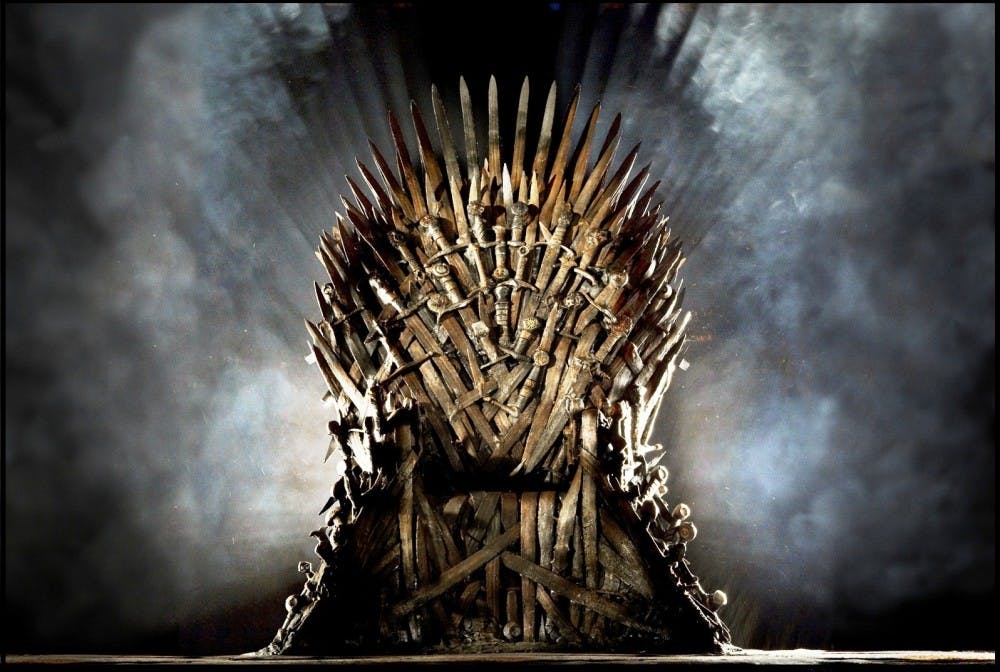Television, which was once condensed to weekly programs on three or four channels, has expanded so vastly in recent years that it's impossible for a person to watch every show of note. In such a diluted market, the TV series-as-a-cultural-event, where, for the course of an hour, a large swath of viewers has their eyes on the same program, has essentially died.
The exception to that rule is "Game of Thrones," which is the only show that, while episodes are airing, everybody is talking about all the time. The question is, how did it manage to accomplish its astronomical and outlying success?
The answer to that is both obvious and complex. On one hand, "Game of Thrones" has the fortune to be based on an already-popular book series, and its home channel, HBO, had both the prestige and funds to give the show a massive marketing campaign and even larger budget upon its inception. You could also credit its success to its catch-all storytelling approach.
Its myriad plots are filled with political drama, high fantasy, steamy romance, soapy drama and epic action; basically, something for everybody. Yet while it has the largest scale of any show in recent memory -- and easily the most stunning and massive battles in television history -- "Game of Thrones" cultivated a fanbase on the strength of its characters, and on its writers' willingness to keep the pace slow as it spent hours making sure that the gigantic roster of characters felt alive and dynamic, so that each death and victory packed an emotional punch.
That is "Game of Thrones" seasons one through six -- the one millions grew to know and love. "Game of Thrones" season seven is a completely different beast. With concern growing over budgetary and time constraints, a new mission seems to have been formed by the show's writers: bring together the continents-spanning story, reach a satisfying conclusion and do it as quickly as possible. Season seven is both the most ambitious and the shortest season yet. As a result, the pace that has been set for years is completely changed, and there are obvious and significant ramifications to the show's quality.
Gone (for the most part) are the long, dialogue-heavy scenes where new characters and relationships are explored. Gone, also, are those beautiful small details about the scope of the world, like how it takes some characters two seasons to learn about the events on the other side of the world, or how another character may be on a horse, riding to a certain destination, for half a season. Instead, "Game of Thrones" 2.0 is all about plot, plot and more plot. If a character doesn't have a revelatory thing to say, they just stand silent (poor Brienne of Tarth, a great character, is rendered almost obsolete here.) People cross all of Westeros then return where they came from in the period of an episode, and crows seem to fly a hundred times faster. It's like Jon Snow and Cersei just got access to Uber and Twitter.
The writers' goals seem to have been to get as many characters together as possible (or kill them off) and to streamline the plot so they could finish everything off in the very short (six episodes) final season. There were big fights, long-awaited reunions and meetings, and surprising moments galore, but these moments felt rather hollow compared to more emotionally resonant spectacles of the past. Previously nuanced heroes and villains like Dany, Jon and Cersei were one-track minds for most of the season; Jon told countless variations of the same speech, Dany's recurring "bend the knee" line became a meme and Cersei's evilness was so trite that if she had a mustache, she would have spent every scene twirling it.
While the show's production is still impressive, this new, plot-first approach casts dark shadows that stop the show from reaching its past glory. But the season finale is an excellent return to character-first form that breathes intrigue and life back into their labyrinthine relationships. That the final episode is so satisfying is proof that "Game of Thrones" hasn't yet lost its luster. In fact, there's a convincing case to be made that, even though it ran into some unavoidable bumps along the way, season seven was the necessary road to reach a fitting conclusion. Will the creators make the right final impressions with the many unforgettable faces of The Known World? Now, there's no excuse for them not to.
(3.5/5 stars)




